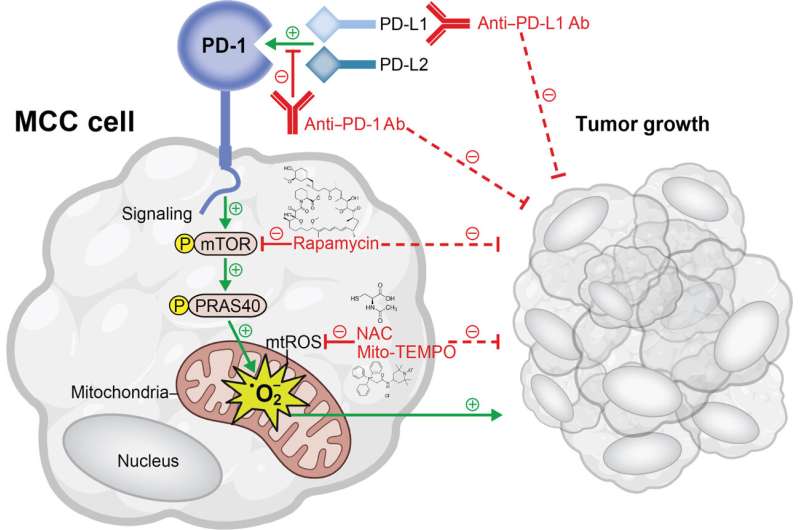This article has been reviewed according to Science X's editorial process and policies. Editors have highlighted the following attributes while ensuring the content's credibility:
fact-checked
peer-reviewed publication
trusted source
proofread
Study identifies new PD-1 immune checkpoint mechanism promoting Merkel cell carcinoma growth

Programmed cell death 1 (PD-1) is an important target for immune checkpoint inhibitor therapies that block its signaling and boost T-cell activity. PD-1 inhibitors have been approved for treating various types of cancer.
However, PD-1 functions can vary between different cell and cancer types, either promoting or suppressing disease progression. Merkel cell carcinoma (MCC), a rare and aggressive form of skin cancer, responds well to immune checkpoint inhibitor therapy. However, it was previously unknown if MCC cells express PD-1 themselves, and unclear how exactly cancer cell-intrinsic PD-1 contributes to tumor growth.
A study led by investigators from Brigham and Women's Hospital, a founding member of the Mass General Brigham health care system, identified a new mechanism through which PD-1 promotes MCC progression. Through a series of experiments, the researchers demonstrated PD-1 expression on MCC cells in preclinical models and patient tumor samples. They found that MCC-PD-1 receptor binding to its ligands accelerated tumor growth by activating the mammalian target of the rapamycin (mTOR) pathway and generating mitochondrial reactive oxygen species (mtROS) to promote MCC growth.
The authors subsequently showed that inhibiting mTOR signaling and neutralizing mtROS suppressed MCC-PD-1-mediated tumor proliferation in mice. These findings, they suggest, might help in the development of new treatments to halt MCC progression even in patients lacking T-cell immunity.
"For the first time, our work identifies PD-1 as an MCC-intrinsic receptor that promotes tumor growth via downstream mTOR signaling and mitochondrial reactive oxygen species production," said corresponding author Tobias Schatton, PharmD, Ph.D., of the Department of Dermatology. "Targeting this tumor-intrinsic PD-1 signaling network could help optimize immune checkpoint therapy regimens and improve MCC patient outcomes."
The research is published in the journal Science Advances.
More information: Christina Martins et al, Tumor cell–intrinsic PD-1 promotes Merkel cell carcinoma growth by activating downstream mTOR-mitochondrial ROS signaling, Science Advances (2024). DOI: 10.1126/sciadv.adi2012




















